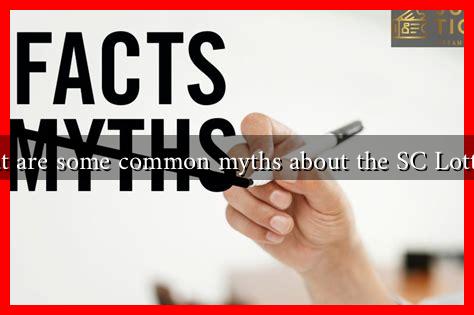-
Table of Contents
What are Some Common Myths About the SC Lottery?
The South Carolina Lottery has been a source of excitement and hope for many residents since its inception in 2002. However, with its popularity comes a plethora of myths and misconceptions that can cloud the understanding of how the lottery operates. In this article, we will debunk some of the most common myths surrounding the SC Lottery, providing clarity and insight into its workings.
Myth 1: The Lottery is a Tax on the Poor
One of the most pervasive myths about lotteries, including the SC Lottery, is that they disproportionately affect low-income individuals. While it is true that lower-income individuals tend to spend a higher percentage of their income on lottery tickets, this does not mean that the lottery is inherently a tax on the poor.
- According to a study by the National Association of State Lottery Directors, lottery players come from all income levels.
- In South Carolina, the lottery generates significant revenue that is allocated to education, infrastructure, and other public services, benefiting all residents.
Thus, while some individuals may spend more on lottery tickets, the overall impact of the lottery extends beyond just one demographic group.
Myth 2: Winning the Lottery is All About Luck
Many people believe that winning the lottery is purely a matter of luck. While luck does play a role, there are strategies that can increase the chances of winning.
- Choosing less popular numbers can improve the odds of not having to share the jackpot with other winners.
- Participating in lottery pools can increase the number of tickets purchased, thereby enhancing the chances of winning.
While no strategy can guarantee a win, understanding the odds and making informed choices can improve the likelihood of success.
Myth 3: Lottery Winners are Always Happy
Winning the lottery is often portrayed as a life-changing event that brings endless happiness.
. However, studies have shown that this is not always the case.
- A study published in the journal “Psychological Science” found that lottery winners often experience a temporary boost in happiness, but this effect diminishes over time.
- Many winners face challenges such as financial mismanagement, strained relationships, and public scrutiny.
For instance, a notable case is that of Jack Whittaker, who won a $315 million Powerball jackpot in 2002. Despite his initial joy, he faced numerous personal and financial difficulties in the years that followed.
Myth 4: The Lottery is Rigged
Another common myth is that lotteries are rigged or manipulated to favor certain players or outcomes. This belief can stem from a lack of understanding of how lotteries operate.
- State lotteries are heavily regulated and audited to ensure fairness and transparency.
- The SC Lottery Commission employs independent auditors to verify the integrity of the games.
In fact, the odds of winning are clearly stated, and the drawing processes are designed to be random and fair. The perception of rigging often arises from the frustration of losing rather than any actual wrongdoing.
Myth 5: You Can’t Win if You Don’t Play Regularly
Many people believe that playing the lottery regularly increases their chances of winning. However, this is a misconception.
- The odds of winning remain the same for each individual ticket purchased, regardless of how often one plays.
- Playing more frequently can lead to increased spending without a corresponding increase in the likelihood of winning.
It’s essential for players to approach the lottery with a clear understanding of their budget and the odds involved.
Conclusion
The South Carolina Lottery, like many state lotteries, is surrounded by myths that can mislead potential players. By debunking these common misconceptions, we can foster a more informed perspective on how the lottery operates. Understanding that the lottery is not just a tax on the poor, that luck is not the only factor in winning, and that winners can face challenges can help individuals make better decisions regarding their participation in the lottery.
Ultimately, the SC Lottery serves as a source of funding for essential public services, and while it can provide excitement and hope, it is crucial to approach it with a realistic mindset. For more information on the SC Lottery, you can visit the official website at sclottery.com.





